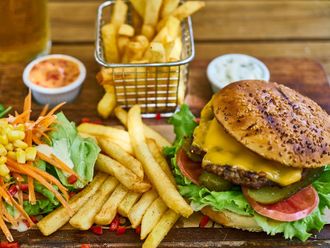
1 Keep healthy eating tools front and centre
The right tools can make healthy eating feasible and practical by reducing the time it takes to prepare fresh, whole ingredients, such as fruits, vegetables, fish and whole grains. While you don't need all the bells and whistles to create a healthy meal, some essential tools can go a long way, especially when you're short on time. Some healthy kitchen gadgets worth investing in include a vegetable steamer, herb saver, vegetable peeler, salad spinner, oil spritzer, slow cooker and handheld blender. Instead of storing them atthe back of the cupboard,keep them front and centre - you'll be more likely to use them and make them part of your routine when they're within reach.
2 Toss those take-away menus
Ordering take-aways when you've had a long day and come home famished may seem like a good idea at the time, but the truth is, your waistline is going to pay the price in the long-term. Meals ordered in (or eaten out) are often three to four times the size of a healthy portion and tend to be packed with hidden sources of calories, fat and sodium thanks to unhealthy cooking methods and added sauces and seasonings. Make your kitchen more meal-friendly by stocking it with healthy convenience foods, such as pre-cut vegetables, canned beans, frozen fish and quick cooking whole grains, like quinoa. Toss those take-away menus (and take your favourite restaurant off speed dial) and instead keep a binder of easy-to-prepare recipes and meal ideas for when you're short on time. Collect recipes and meal ideas from magazines and cookbooks, or print them off the internet.
3 Spice things up
Using dried spices and fresh herbs, like cumin, cinnamon and basil, is one of the easiest and most affordable ways to cut extra calories in the kitchen. Using spices and herbs in place of butter, oil, dressing or packaged seasoning also adds flavour to dishes without added sodium, sugar or fat. What's more, some spices and herbs are packed with nutrients and have powerful medicinal properties. Cloves, for example, are an excellent source of manganese, a mineral that helps maintain normal blood sugar levels and promotes optimal thyroid function. Turmeric, on the other hand, is packed with antioxidants and has strong anti-inflammatory and anti-cancer properties. Store dried spices in a cool, dark cupboard to maximise shelf life where they'll stay good for up to a year. Fresh herbs are best stored upright in a glass of water in the refrigerator.
4 Out of sight, out of mind
Despite your best efforts, science shows that simply seeing food can give you the desire to eat it. In fact, one study found that people given a clear box of chocolates they could see consistently ate 71 per cent more, compared to people given a covered box of chocolates. Whether it's chocolate, candy, crisps or soda, it's important to remove unhealthy and junk food from plain sight. While it's best to keep it out of the house altogether, storing junk food on a top shelf, in an opaque container, or at the back of the fridge can help you cut back on your intake. Likewise, keeping healthy options front and centre, like a bowl full of fresh fruit on the countertop or fresh cut veggies in the refrigerator, can help boost your intake of lower calorie foods.
5 Downsize your dishes
Oversized dishes, glasses and utensils are perhaps one of the biggest culprits of overeating at home. Research show that when people eat off bigger plates, or drink from bigger glasses, they consistently consume more calories. One study from researchers at Cornell University found that when people were given a large bowl to serve themselves ice cream, they dished up 31 per cent more than people with a small bowl. Combined with a large serving spoon, serving size jumped a whopping 57 per cent. Avoid unnecessary calories by downsizing your dishes; either by purchasing smaller dinnerware, or using side plates instead of dinner plates for your meals. As for glassware, tall skinny glasses may be a healthier choice than short, wide glasses. Research shows that people tend to pour as much as 74 per cent more into short, wide glasses compared to tall, slim ones.
6 Divide and conquer
Studies show that regardless of the food, the larger the container or box it comes in, the more that will get eaten. In fact, one study from researchers at Cornell University in the US found that when preparing pasta, people given a larger box of spaghetti prepared nearly 25 per cent more, and ate an additional 150 calories per meal. The same findings applied to snack foods as well; people given a half-kilogram bag of candy ate a whopping 90 per cent more than people given a bag of candy that contained half as much. Take the guesswork out of portion control by pre-measuring individual servings of common foods, such as meat and rice and especially snack foods like crisps, crackers and cookies. Don't leave portion control to guesswork, use measuring cups and a food scale to measure appropriate portions. Store individual portions in re-sealable bags,or colourful glass jars for fail-proof snacking and meal preparation.
7 Let the light shine in
Letting plenty of light into your kitchen can do more than just make it more inviting, it can also help you eat less. Studies show the dimmer the lighting, the greater likelihood of overindulging and bingeing thanks to lowered inhibitions. A bright kitchen helps bring awareness to what, and how much, you're eating, and it also creates a space you're more comfortable spending time in. The added benefit is that a bright room can help improve your mood, so you'll be less likely to nosh because of the blues. So open those curtains, install brighter bulbs, and get an extra light fixture for the kitchen - your waistline will thank you.
8 Turn off the TV
Eating while watching TV may not seem like a bad idea, especially when you're alone, but research shows it can add extra calories to your meal. In fact, studies show that distractions of any kind while eating, whether it's watching TV, reading a book, or checking email lead people to overeat because it takes attention away from what, and how much, they're eating. It's easy for satiety cues to be drowned out or replaced by external distractions, so don't rely on things like the end of TV programme to stop eating. Create a healthy eating environment by moving the television and computer, and other distractions away from the kitchen and dining room, and instead focus on the task at hand. Research shows that mealtimes are a prime time to strengthen relationships with family members, so take advantage of that time together to talk about your day and enjoy a healthy meal together.
















